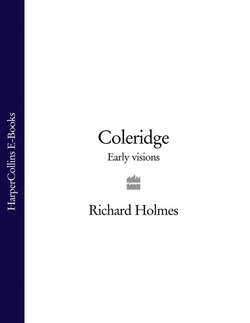Читать книгу Coleridge: Early Visions - Richard Holmes - Страница 36
3
ОглавлениеWhen Hucks finally dragged Coleridge off to Gloucester (by the mail) on 5 July, it had been decided that Southey would return to Bristol to canvass for Pantisocrats among his Balliol College friends George Burnett and Robert Lovell, and find others. Coleridge would proselytise in Wales, and they would perhaps meet again in Aberystwyth to plan the financing of the scheme by the sale of Imitations, Joan of Arc, and other literary work. While Southey wrote long, apocalyptic letters prophesying violent revolution in England, and urging his friends to join him in Kentucky (the first site for Pantisocracy), Coleridge adopted an altogether lighter touch. The difference in tone here was already significant, for there was always an element of humorous fantasy in Coleridge’s Pantisocracy which quite escaped Southey’s earnestness. Having seen a poor beggar girl ejected from their inn for begging a bit of bread and meat, Coleridge announced to Southey: “When the pure System of Pantisocracy shall have aspheterized the Bounties of Nature, these things will not be so –! I trust, you admire the word ‘aspheterized’ from a non, proprius!…We really wanted such a word – instead of travelling along the circuitous dusty, beaten high-Road of Diction, you thus cut across the soft, green pathless Field of Novelty! Similies forever! Hurra!” At the end of this letter, he gravely promised his “sturdy Republican” a more “sober & chastised Epistle” in his next. Meanwhile, “Fraternity & civic Remembrances” were conveyed to Lovell.11
With disconcerting swiftness, the patriot trooper and the prodigal son now gave way to the missionary Pantisocrat and republican. After long hours of foot-slogging over white, dusty roads which seemed to quiver in the summer heat through Hereford and Shropshire, Coleridge was indefatigable. At the King’s Arms, Ross, he scratched democratic verses upon the window shutter, speaking of “wine-cheer’d moments” and the honest man of Ross, friend to the friendless, and “nobler than Kings or king-polluted Lords”. At Llanfyllin, beyond Welshpool, he “preached Pantisocracy and Aspheterism with so much success that two great huge Fellows of Butcher like appearance, danced about the room in enthusiastic agitation”. They drank seditious toasts in brandy to the King: “May he be the last”.
At Bala, according to Coleridge, they almost got in a pub-room brawl when he provokingly proposed an American toast, to General Washington, in front of the local JP, the doctor, the parson, and other assembled Welsh worthies. The doctor immediately countered with: “I gives a sentiment, Gemmen! May all Republicans be gullotined!” and this was answered by a Welsh democrat who proposed guillotining fools. “Thereon Rogue, Villain, Traitor flew thick in each other’s faces as a hailstorm.”
Coleridge claims to have finally pacified everyone by appealing to Christian brotherhood, and they all shook his hand (except for the parson) calling him “an open-speaking, honest-hearted Fellow, tho’ I was a bit of a Democrat”. Coleridge varied these accounts for comic effect, in another saying he had proposed the toast to Priestley (an even greater provocation), and caught fleas from the Welsh democrat: “I trembled, lest some discontented Citizens of the animalcular Republic should have emigrated.”12 Hucks says they took no part in the dispute at all, but silently withdrew.13
Coleridge’s play-acting and high-spirited fooling was partly for Southey’s benefit. It was a sort of exhibitionism with which he often dazzled and delighted new friends, a form of intellectual flirtation, a floor-show, an intense desire to please and astound. He later came to regard this as one of the great moral weaknesses of his character, and an older and wiser Southey would upbraid him for it. But it was also the result of genuine excitement and enthusiasm, the discovery of a cause which he felt would rescue him from all the confusions and disappointments of Cambridge. Eleven years after, in Malta, he soberly looked back at this “stormy time”, when “for a few months America really inspired Hope, & I became an exalted Being.”14
Writing publicly in The Friend in 1809, at a time of political reaction, he still acknowledged that exaltation, and saw Pantisocracy with great perception as a peculiar product of the French revolutionary excitement. More than that, he claimed it as essential to his education in human affairs. This passage is important in the light of the accusations of political apostasy, which were subsequently heaped on him by William Hazlitt and others.
My feelings, however, and imagination did not remain unkindled in the general conflagration; and I confess I should be more inclined to be ashamed of myself, if they had! I was a sharer in the general vortex, though my little World described the path of Revolution in an orbit of its own. What I dared not expect from constitutions of Government and whole Nations, I hoped from Religion and a small Company of chosen Individuals, and formed a plan, as harmless as it was extravagant, of trying the experiment of human Perfectibility on the banks of the Susquahannah; where our little Society, in its second generation, was to have combined the innocence of the patriarchal Age with the knowledge and genuine refinements of European culture: and where I had dreamt of beholding, in the sober evening of my life, the Cottages of Independence in the undivided Dale of Industry…Strange fancies! and as vain as strange! yet to the intense interest and impassioned zeal, which called forth and strained every faculty of my intellect for the organization and defence of this Scheme, I owe much of whatever I at present possess, my clearest insight into the nature of individual Man, and my most comprehensive views of his social relations…15
It is an exculpatory statement, perhaps; yet much of it is borne out in the ideological struggle with Southey that developed over the next few months, in London and Bristol.
